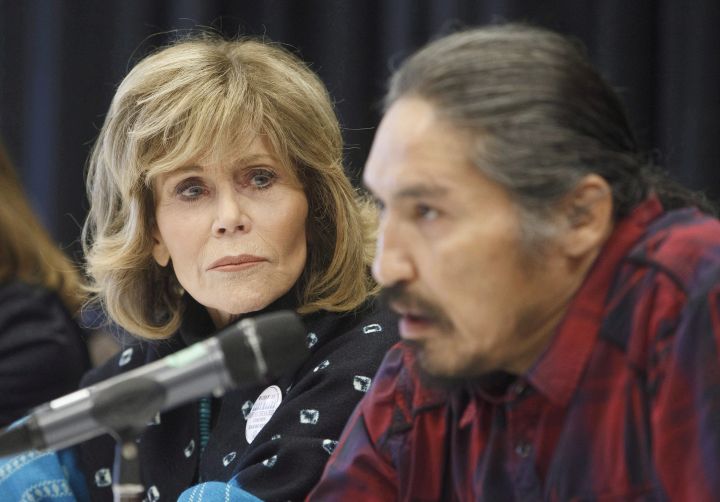It was supposed to be a triumph.

South African anti-apartheid hero Archbishop Desmond Tutu was joining the chief of the Athabasca Chipewyan First Nation in his struggle against environmental degradation from the northern Alberta oilsands.
But for Allan Adam — now at the centre of controversy over his violent arrest outside a casino — it turned out to be something more complex. And emblematic.
READ MORE: Trudeau says video of Chief Allan Adam’s RCMP arrest raises ‘serious questions’
“The preacher’s gonna preach,” Tutu said on that sunny day in May 2014 in Fort Chipewyan, Alta.
Preach he did. The oilsands, he said, were “filth,” reflecting “negligence and greed.”
Outside, after the jeremiad, Adam seemed slightly aghast at the speech his band had partly sponsored. At the time, the First Nation was doing $270 million worth of business a year with the energy industry and Adam himself was part of it.
“People have their own opinion,” he said.
That would be doublethink for anyone else, at any other place or time. For Adam, who has been chief since 2007, it was a signature.
“Those contradictions are his strength,” said Larry Innes, who has been the band’s lawyer for 16 years and counts Adam as a friend.
“He’s a born leader. He’s a war chief.”
One of the most reliably outspoken Indigenous leaders in Alberta, Adam’s language is blunt no matter what the topic.

Get breaking National news
When he first became chief, he threatened a moratorium on the oilsands.
Criticizing how his First Nation was treated during the 2016 Fort McMurray wildfire, he said: “All these heads started looking at each other and they had no answers for me. It was clearly evident they had no plans.”
Again and again, his band has taken the provincial government to court over development the First Nation feels infringes on its treaty rights. Adam is almost gleeful about those battles being funded by the band’s energy business.
READ MORE: Greta Thunberg meets with First Nations in Fort McMurray, shoots documentary
He’s welcomed A-list celebrities to Fort Chipewyan who want to join the fight: rock legend Neil Young; actors Jane Fonda, Daryl Hannah and Leonardo DiCaprio; Hollywood director James Cameron, Swedish climate activist Greta Thunberg. Adam greets them in jeans, leather jacket, messy ponytail and trademark grin.
Meanwhile, he cuts deals with industrial giants like Teck Resources and talks about wanting to own a pipeline. Innes has seen him in action.
READ MORE: Teck project environmental deal reached between First Nation and Alberta government
“Every oil executive has learned that Allan comes into that meeting as a hunter, with a good understanding of what he wants to see and a really good understanding of the environment he’s walking into.
“He’ll say things directly to the company representatives but he’ll do so in a way that leaves them room to respond.”
Recently, Adam has at times sounded more conciliatory.
“The fact is I am tired,” he told CBC in 2018.
“I am tired of fighting. We have accomplished what we have accomplished. Now let’s move on and let’s start building a pipeline and start moving the oil.”
- Best friends who played on Jasper hockey team remembered as ‘bright shining lights’
- Cervical cancer is ‘fastest-rising’ form in Canada as doctors urge action
- Canada’s military recruitment surged amid sovereignty threats: data
- Amid 2026 uncertainty, new data set to show how Canada’s economy ended 2025
Don’t be fooled, said Innes. Adam sees not only the pieces in play, but the entire chessboard.
“He understands the world for what it is. Certain things can be changed, certain things can be changed sooner than others.”
Yes, said Innes, his friend can be obstreperous.
“He never starts that way. He’s direct. He doesn’t defer to the assumed authorities around him. When people are not seeing the challenge in the same way, he calls them on it.”
It’s all about getting things to move forward.
Innes has another memory of that day with Tutu. After the speech in which the clergyman lambasted the resource that provides Adam’s band its wealth, they spent some time together.
“The two of them were giggling like kids.”


















Comments
Want to discuss? Please read our Commenting Policy first.